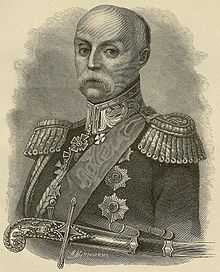Friedrich Caspar von Geismar

Friedrich Caspar von Geismar (also known as Fyodor Geismar, Russian: Фёдор Клементьевич Гейсмар; 1783-1848) was a Austrian-German military officer who spent the best part of his career in the service of Imperial Russian Army. He eventually rose to the rank of General and became an adjutant to tsar Nicholas I of Russia.
Biography
He was born on 12 May 1783 in Ahlen, where his parents were accompanying the court of the king of Prussia. He was an heir to the Dössel line of an old Austrian-German noble family of Geismar zu Riepen from the castle of Warburg. His parents were Clemens August, Baron von Geismar, the commander of Guard Regiment of the kings of Prussia and Bernadina de Berswardt.
On 2 August 1798, at the age of 15, he joined the Lower Austrian 4th Infantry Regiment "Hoch- und Deutschmeister". He served with his unit in the disastrous battle of Austerlitz, where his unit was destroyed by Napoleon Bonaparte. After the battle he joined Russian service and fought in the ranks of Russian Imperial Army during the French invasion of Russia.
After the Battle of Leipzig he was given command of a Cossack cavalry regiment and the task of escorting the ducal family back to Weimar where he defeated a French attack, for which the city of Weimar awarded him honorary citizenship and his masonic lodge promoted him to a higher rank. The latter ceremony impressed German poet Johann Wolfgang von Goethe to write his poem Creed. In 1830 on his return to his native town of Ahlen also awarded him with honorary citizenship.
Later that year he returned to Russian military service and fought against the November Uprising. In a series of defeats he lost most of his soldiers in the battles of Stoczek, Iganie and Wawer, but was given command over a new force and took part in the final Battle of Warsaw. During the struggle for Fort 54 (Ordon's Redoubt) he was severely wounded. After the war he served as the commanding officer of the I Corps and finally retired in 1840.